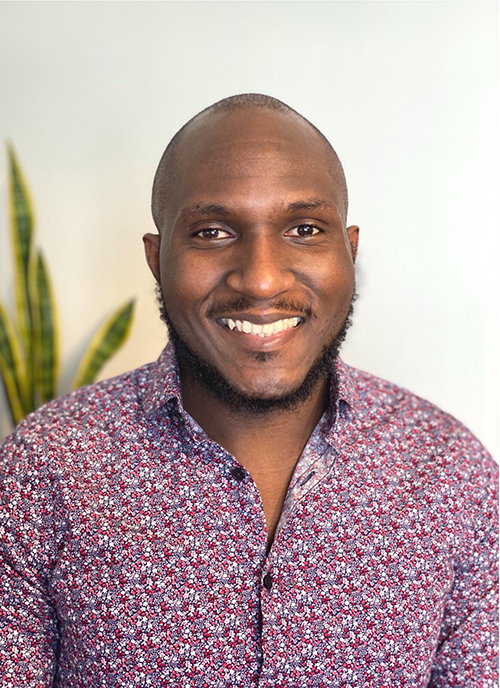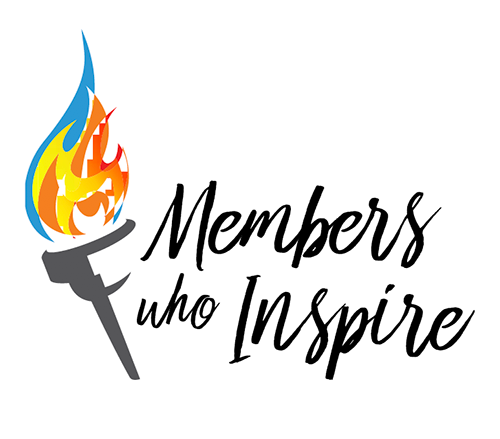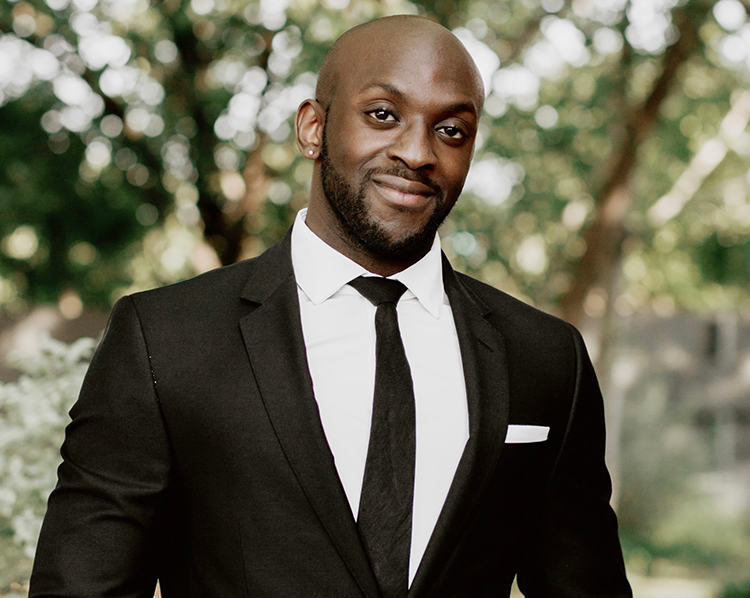Brice Ngameni helps support prospective law students of African descent

Brice Ngameni graduates this month as part of Harvard Law School's Class of 2021.
Brice Ngameni, an international student from Cameroon, attends Harvard Law School. By the time he was a 3L, several people of African descent had found him on social media and asked him how to apply to law school.
Ngameni told his cousin Danielle Makia, a graduate of William & Mary Law School whose parents also immigrated from Cameroon, about these conversations. He discovered she had similar discussions and proposed an idea: What if they created an organization that could regularly meet this need in their community?
Ngameni and Makia, along with friend Aïta Seck, a 2L at Columbia Law School, put together their plan in December. They decided to call the organization Pembe, which means ivory in Swahili. Its mission would be to break the “ivory ceiling” in the American legal system by pairing prospective law students of African descent with attorneys and law students who could help them prepare for the LSAT and advise them on the admissions process.
“We really want to serve our community,” says Ngameni, who serves as Pembe’s president. “We think that one of the biggest challenges that people from our background face when applying to law school is [the lack of] access and information, and these are things that can be addressed. If you just have the right people matched up with the right folks, you can easily make up for that disparity.”
They asked more students and alumni from Harvard and other law schools to join their leadership team, created a website and applied for 501(c)(3) nonprofit status. They began recruiting mentors, and as of mid-April, had nearly 30 who were interested. They also recently started signing up potential mentees.
 Danielle Makia was able to give her cousin Brice Ngameni tips on studying for the LSAT. Photo by Jean Baker of Jean Baker Photography.
Danielle Makia was able to give her cousin Brice Ngameni tips on studying for the LSAT. Photo by Jean Baker of Jean Baker Photography.
Makia describes Ngameni as the “nucleus” of the leadership team, pointing out that most of its members are connected to him in some way. Aside from being well-connected, she says his fairness and transparency also make him a strong leader for their organization.
“Like a true lawyer, he tries to hear everyone’s side before reaching a decision, and he really appreciates everyone’s viewpoints when it comes to making huge decisions that affect the organization,” says Makia, an associate at Goldman Sachs in New York City. “And if he needs help with something, he’s not afraid to ask, which I think is an outstanding quality of a leader.”
Ngameni followed his childhood dreams to law school in the United States
As a child, Ngameni had a passion for justice and speaking up for others. He never shied away from a spirited debate, and even though the only lawyers he knew anything about were the ones he saw on TV, he decided to go to law school and practice law in the United States.
“I’ve generally been fascinated with the American ideal of multiculturalism and the notion that folks can come from different parts of the world and feel accepted,” he says. “For all its flaws, that dream or that perception has a lot of appeal for folks on the outside. I was one of those people.”
Ngameni, whose native language is French, learned to speak English by watching 24 and other TV shows in high school. He moved to Maryland after he graduated and began attending community college. He lived with his uncle, who, along with other family members and friends already living in the United States, helped him adjust and know what to expect in school.

He transferred to American University in Washington, D.C., where he studied accounting, business and economics. He worked for Citigroup in New York City during the summer and returned to work at the global bank after he graduated in 2012. During the next six years, he enjoyed handling transactions in sub-Saharan Africa and other emerging markets. But he didn’t give up on his childhood dream of pursuing a legal career.
Ngameni says it became even more important after the loss of his father one year after he came to the United States.
“That was one of the moments that I really committed,” he says. “I had talked to him about my dream of becoming a lawyer, and he was extremely supportive. And so when he passed away, that was an extra motivation for me to never give up on that dream.”
To Ngameni, the law school admission process seemed daunting. While his English had improved significantly, he says he wasn’t sure he could succeed in a competitive environment with other prospective students who had been speaking the language their whole lives. He started looking for attorneys and asking them questions about what he could do to strengthen his application.
He found another helpful resource in his cousin Makia, who gave him tips on how to boost his LSAT score and improve his personal statement.
“At that point, I had someone in my family who was in the process of becoming a lawyer in the United States that I could go to and ask questions,” Ngameni says. “That was a game changer for me.”
Pembe aims to support prospective law students of African descent through mentoring and admissions advising
Ngameni, who will graduate from Harvard Law later this week, hopes to help prospective law students overcome the same challenges he faced just a few years ago.
One of Pembe’s goals is to offer its mentees a curriculum that can improve their LSAT scores. Ngameni says the organization started by drafting and making available resource materials and partnering with Dear Future Colleague, another organization that supports underrepresented law school and competitive scholarship applicants. Its materials are also provided to mentees.
 The Pembe team holds a Zoom meeting.
The Pembe team holds a Zoom meeting.
“It’s no secret that the LSAT has significant weight when it comes to law school admission decisions, but it also often affects the size of the financial aid package that admitted students receive,” he says. “Because we’re serving communities that tend to be economically more challenged than the rest of the country, we want to make sure that they are as competitive as possible.”
Pembe also plans to help mentees draft their personal and diversity statements for their law school applications. The organization will provide potential guidelines and examples of statements from its leadership team. It will ask mentors to review and provide feedback on their mentees’ statements once they’re ready.
 “We can step up and say, ‘I’ve gone through this before,’” says Patrick Ntchobo, the co-director of mentor recruiting at Pembe.
“We can step up and say, ‘I’ve gone through this before,’” says Patrick Ntchobo, the co-director of mentor recruiting at Pembe.
Patrick Ntchobo, a first-generation American whose parents immigrated from the Ivory Coast, is the co-director of mentor recruiting at Pembe. He graduated from Stanford Law School in 2020 and contends that the law school admission process is difficult enough for people who don’t have language or cultural barriers.
“We can step up and say, ‘I’ve gone through this before; this is what a personal statement should look like,’ or ‘I’m also a French speaker; I know what you’re trying to say by this sentence, and here’s a better way of making that work,’” says Ntchobo, an associate in the San Francisco office of Covington & Burling. “All of those things can make a huge difference in the application process, and that’s what we hope will lead to more Africans represented in the American legal profession, which will lead to more Africans represented in courtrooms, in board rooms, in places of power and decision-making in the world.”
Ngameni points out that all of Pembe’s services and any future networking events for mentors and mentees will be free. The only thing the organization asks is that mentees commit to becoming mentors or officers of the organization once they get to law school.
“We are doing all of this to make sure people don’t have to pay very expensive law school admission consultants for services that within our community we can provide,” says Ngameni, who also recently discovered he could become a law student member of the ABA for free. “We have a critical mass of attorneys who care, who are willing to give back, and we want to leverage that.”
For information on how to get involved as a Pembe mentor or mentee, visit the organization’s website.
Members Who Inspire is an ABA Journal series profiling exceptional ABA members. If you know members who do unique and important work, you can nominate them for this series by emailing [email protected].



